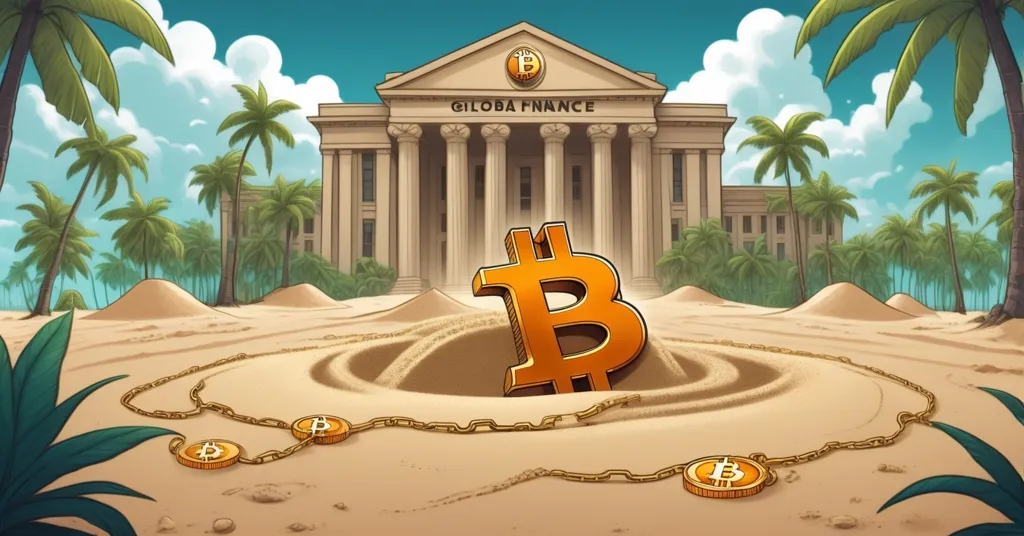El Salvador Halts Bitcoin Buys Since February 2025 Under IMF Pressure

El Salvador’s Bitcoin Dream Hits IMF Roadblock: No Buys Since February
El Salvador, the trailblazer of nation-state Bitcoin adoption, has quietly slammed the brakes on its crypto ambitions. A bombshell report from the International Monetary Fund (IMF) dated July 15, 2025, reveals that the country hasn’t purchased a single Bitcoin since February 2025, directly contradicting President Nayib Bukele’s public boasts of snagging one BTC daily.
- Purchases Halted: IMF confirms no new Bitcoin buys since February 2025, despite Bukele’s claims.
- Policy U-Turn: Chivo wallet privatization set for July 2025 under IMF loan terms.
- Holdings Static: El Salvador holds 6,244 BTC worth $742 million, with wallet activity limited to internal transfers.
Bukele’s Bitcoin Vision Clashes with IMF Reality
In 2021, El Salvador shocked the world by adopting Bitcoin as legal tender under Bukele’s leadership, a move hailed as a radical push for financial inclusion and a direct challenge to the fiat-dominated financial order. The “1 BTC per day” policy became a battle cry for Bitcoin maximalists, a sign of a nation betting big on decentralization. But the IMF, a gatekeeper of traditional finance, has long viewed this experiment with suspicion, warning of fiscal volatility and transparency headaches. Fast forward to December 2024, and a $1.4 billion loan agreement with the IMF has forced El Salvador into a corner. The deal wasn’t a blank check—it came with demands to dial back the Bitcoin obsession or risk economic ostracism. The IMF’s latest report on El Salvador halting Bitcoin purchases cuts through the noise: no fresh Bitcoin has entered the national treasury since February 2025, even as Bukele’s social media posts paint a different picture. Is this a calculated PR stunt to keep the crypto crowd cheering, or a glaring misstep in communication?
For context, that $1.4 billion loan isn’t just pocket change for a small nation like El Salvador, which grapples with debt and inflation pressures. The IMF’s conditions often mean prioritizing budget stability over risky experiments—think of it as a parent telling a teenager to stop blowing cash on volatile stocks. Complying with these rules might be less about abandoning Bitcoin and more about survival in a world where traditional finance still holds the whip. But for a country that staked its identity on disrupting that very system, this pivot stings.
Holdings, Transfers, and Transparency Gaps
Let’s get into the numbers. El Salvador currently sits on 6,244 BTC, valued at approximately $742 million, per the El Salvador Bitcoin Office. That’s a significant hoard, built during the peak of Bukele’s crypto crusade. Blockchain trackers like Arkham have spotted 1 BTC daily transfers from exchanges such as Binance and Bitfinex to addresses tied to the government, sparking speculation of continued accumulation. But the IMF is blunt: these are internal shifts, moving coins from cold storage (secure, offline digital vaults for long-term holding) to hot wallets (online, accessible for quick use), not new purchases. A letter co-signed by Central Bank President Douglas Pablo Rodríguez Fuentes and Finance Minister Jerson Rogelio Posada Molina confirms,
“The stock of Bitcoins held by the public sector remains unchanged.”
For more on these discrepancies, check out the detailed IMF report analysis.
So why the disconnect between Bukele’s bold tweets and the cold, hard data? Blockchain is a public ledger—anyone can peek at transaction records with the right tools. When government claims don’t match what’s visible on-chain, it’s not just a PR hiccup; it’s a trust issue. Are these daily transfers a clever sleight of hand to maintain hype, or simply routine housekeeping misunderstood by an eager public? Transparency, one of Bitcoin’s core strengths, becomes a double-edged sword when a nation’s actions are under global scrutiny. For deeper insights into these contradictions, see this analysis of Bukele’s claims versus on-chain data.
Chivo Wallet’s Fall from Grace
Then there’s the Chivo wallet, El Salvador’s state-backed gateway to Bitcoin for the masses. Launched with fanfare as a tool to onboard citizens into the crypto economy, it’s now facing the axe. Under IMF pressure to minimize fiscal exposure—essentially, to avoid gambling public funds on Bitcoin’s rollercoaster—the government has agreed to privatize Chivo by July 2025, ending state funding and control. This isn’t just logistics; it’s a symbolic gut punch to the vision of a state-driven crypto revolution. Learn more about the Chivo wallet privatization plans.
For those new to this, legal tender status means a currency must be accepted for all transactions and debts—like how you can’t refuse dollars in the U.S. When Bitcoin held that status in El Salvador, businesses had to take it, price swings be damned. As of January 2025, that’s history. The IMF now classifies Bitcoin as a financial asset, akin to a speculative stock in the national portfolio, not a daily currency. Their report doesn’t shy away from gloating, praising these changes for
“reducing fiscal risk and strengthening transparency.”
In plain speak, they’re saying, “Good job, now stop playing with fire.” For a broader look at Bitcoin’s policy history in El Salvador, there’s plenty of background to explore.
But what about the average Salvadoran? Reports on Chivo’s adoption have been mixed from the start—technical glitches, low trust in digital payments, and Bitcoin’s volatility didn’t exactly win over a population already skeptical of government initiatives. With privatization looming, are citizens relieved to see this experiment scaled back, or bitter that the promised financial freedom feels further away? This rollback raises hard questions about whether top-down crypto adoption can ever mesh with on-the-ground realities.
Global Bitcoin Treasuries: A Stark Contrast
While El Salvador bends to IMF demands, others are charging ahead with Bitcoin treasury strategies. Japan’s Metaplanet recently scooped up 797 BTC for $93.6 million and is plotting to acquire a digital bank for crypto services, positioning itself as a regional crypto powerhouse. France’s Blockchain Group and the UK’s Smarter Web Company have jointly added over 340 BTC to their reserves. Then there’s MicroStrategy, the corporate Bitcoin juggernaut, boasting a staggering $14 billion in unrealized gains for Q2 2025. These players see Bitcoin as digital gold, a shield against fiat erosion and inflation, unfazed by the volatility that spooks traditional economists.
Why the difference? Corporations and private entities face less systemic pushback than sovereign nations. They aren’t tethered to IMF loan conditions or geopolitical chess games. El Salvador’s retreat under centralized financial pressure contrasts sharply with these aggressive accumulations. Could it be that the real Bitcoin revolution is shifting from governments to boardrooms? If so, the ethos of decentralization might still thrive—just not in the way Bukele envisioned. For a deeper dive into how the IMF impacts national Bitcoin strategies, the broader context is worth exploring.
Playing Devil’s Advocate: Does the IMF Have a Point?
Let’s flip the script for a moment. While we champion Bitcoin’s potential to upend the status quo, it’s worth considering the IMF’s caution. For a debt-laden nation like El Salvador, Bitcoin’s wild price swings could indeed wreak havoc on national budgets. A sudden crash during a bull run buy could mean millions in losses—money that might otherwise fund hospitals or schools. The IMF’s push for stability over speculation isn’t just bureaucratic meddling; it’s grounded in a reality where economic missteps hit the poorest hardest. Still, their playbook reeks of control, not innovation. Bitcoin’s promise of freedom from fiat tyranny doesn’t jive with austerity measures and centralized oversight. So, is this caution pragmatic or a chokehold on progress? For varied perspectives on why the IMF resists pro-Bitcoin policies, community discussions offer some insight.
Some crypto advocates argue that nations willing to stomach short-term volatility could reap massive rewards as Bitcoin matures as a global reserve asset. Look at MicroStrategy’s gains—$14 billion isn’t chump change. If El Salvador had doubled down during dips, would they be sitting on similar profits today? Or would they be bankrupt under the weight of IMF debt? It’s a gamble either way, and Bukele’s government seems caught between a rock and a hard place.
Future Outlook: A Temporary Detour or Permanent Retreat?
The IMF isn’t done with El Salvador yet. Further reviews are slated for September and December 2025 to ensure compliance with these watered-down Bitcoin policies. Meanwhile, the transparency puzzle lingers. Blockchain analytics tools empower anyone to track government wallets, but without clear communication, even routine transfers spark conspiracy theories. Could El Salvador pivot back to aggressive Bitcoin adoption if global sentiment shifts—say, during another bull run or if more nations jump on the BTC bandwagon? Or does this mark a permanent step back, proof that centralized powers will always clip the wings of decentralized dreams? For ongoing debates, check out community reactions to El Salvador’s Bitcoin halt.
Let’s not bury the lead here: this feels like a setback for the decentralization ethos Bukele once roared about. But Bitcoin’s story is a long game. Nations adapt, markets evolve, and the IMF’s iron grip might loosen if the world tilts further toward crypto acceptance. For now, while regulators play financial chess, effective accelerationism—market-driven adoption—might be the true engine of change. Corporations like MicroStrategy are hoarding BTC while governments waffle. Maybe the revolution was never meant to start in parliament halls but in the balance sheets of the bold. For updates on the impact of IMF loan conditions on Chivo’s privatization, the financial implications are significant.
Key Questions on El Salvador’s Bitcoin Policy Shift
- Why did El Salvador stop buying Bitcoin in February 2025?
A $1.4 billion IMF loan from December 2024 came with strict conditions, forcing the government to prioritize economic stability over crypto accumulation amid debt and inflation challenges. - What’s driving the Chivo wallet privatization by July 2025?
Under IMF reforms, El Salvador is slashing public sector exposure to Bitcoin’s volatility, ending government funding and control of the state-backed wallet as a risk management move. - How much Bitcoin does El Salvador hold, and are they still acquiring?
The nation holds 6,244 BTC, valued at $742 million, with no new purchases since February 2025—only internal wallet shifts, despite Bukele’s claims of daily buys. - What’s the IMF’s current stance on Bitcoin in El Salvador?
The IMF views Bitcoin as a high-risk financial asset, not mandatory legal tender, pushing for stringent risk controls over broad national adoption to safeguard macroeconomic health. - Why the gap between Bukele’s statements and blockchain data?
Bukele’s claims of daily purchases clash with IMF reports and on-chain analysis by firms like Arkham, showing only internal transfers, exposing a critical transparency shortfall. - What does this mean for sovereign Bitcoin adoption worldwide?
El Salvador’s rollback under IMF scrutiny contrasts with rising corporate and national Bitcoin treasuries, raising doubts about whether centralized financial powers will perpetually hinder decentralized ambitions.



